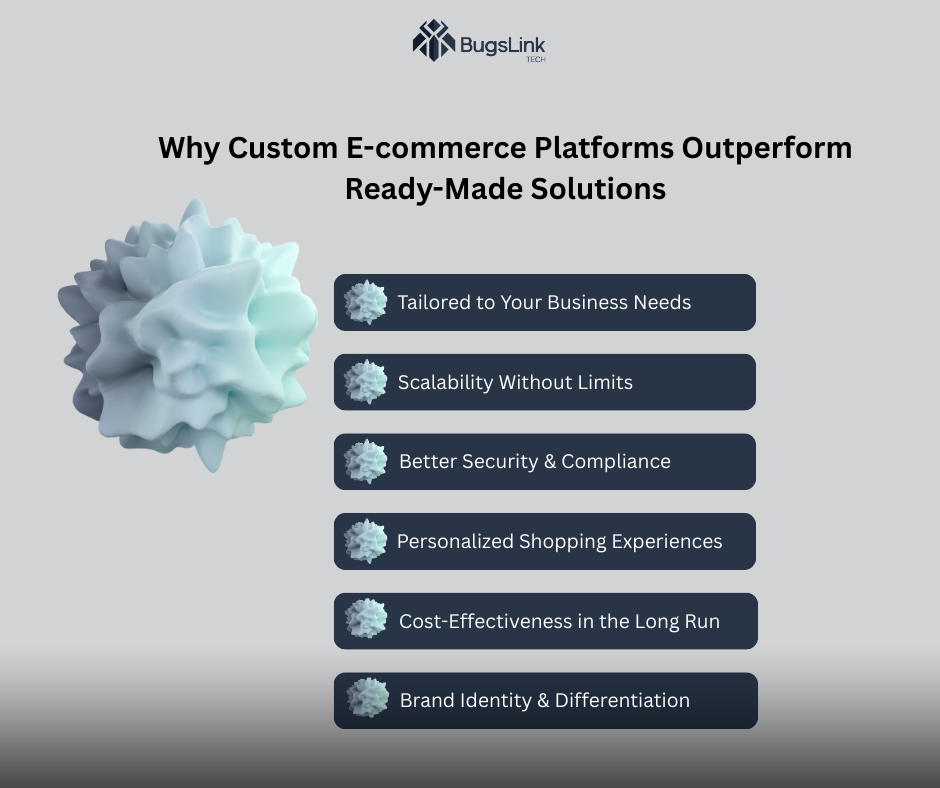If you’re launching or scaling an online store, you’ve probably faced this question: Should I go with a ready-made e-commerce platform like Shopify, WooCommerce, or BigCommerce, or invest in a custom-built solution?
At first glance, ready-made platforms look appealing. They’re quick, easy to set up, and often come with plug-and-play features. But as your business grows, the limitations start to surface, from lack of customization to scalability roadblocks.
That’s where custom e-commerce development comes in. In 2025, it’s not just a luxury, it’s becoming the smarter choice for businesses that want to grow, compete, and innovate.
You can also visit blog: https://bugslink.com/how-to-make-an-accessible-website-on-wordpress/
Ready-Made E-commerce Platforms: A Quick Overview
Platforms like Shopify, Magento, and WooCommerce provide pre-built frameworks for online stores. They are easy to launch, relatively cost-effective in the beginning, and great for small businesses or startups testing the waters.
However, these platforms come with trade-offs. They offer limited customization, recurring monthly subscription costs, and a heavy reliance on plugins that may create security risks. More importantly, as your business scales, these platforms can struggle to keep up with increasing demands.
In short, they’re good for “getting started,” but not ideal for long-term brand growth.
Why Custom E-commerce Platforms Outperform Ready-Made Solutions
1. Tailored to Your Business Needs
Every business is unique, and so are its requirements. A custom-built platform ensures that features are designed specifically for your workflows, customer journeys, and payment systems. For example, a fashion retailer can implement an AI-powered recommendation engine built around their catalog, not a generic plugin.
2. Scalability Without Limits
With ready-made solutions, scaling often means higher subscription fees or even hitting platform limitations. A custom platform allows you to handle high traffic seamlessly, add new features without restrictions, and integrate with third-party systems like ERP, CRM, or POS tools.
Think of Amazon-level scaling, that’s only possible with a tailored system.
3. Better Security & Compliance
E-commerce businesses are prime targets for cyberattacks. Ready-made platforms rely heavily on third-party plugins, which hackers frequently exploit.
With a custom platform, you can build robust security protocols, ensure PCI-DSS compliance for payment safety, and schedule regular updates aligned with your business needs. This level of control is crucial when handling sensitive customer data.

4. Personalized Shopping Experiences
Today’s consumers expect more than just browsing products, they want personalized shopping journeys. Custom e-commerce platforms make it possible to implement:
- Smart product recommendations
- AI-powered chatbots
- Dynamic pricing engines
- Personalized promotions and loyalty programs
These features improve customer engagement and retention,something off-the-shelf platforms struggle to deliver without heavy modifications.
5. Cost-Effectiveness in the Long Run
While custom development requires a higher upfront investment, it saves money over time. You eliminate recurring subscription fees, reduce dependency on third-party plugins, and gain full ownership of your platform.
Instead of “renting” a store, you own the technology behind it.
6. Brand Identity & Differentiation
Using Shopify or WooCommerce templates often results in similar-looking online stores. Custom development allows you to create a unique brand identity and design that sets you apart from competitors.
In a crowded e-commerce space, standing out can be the difference between success and failure.
Real-World Example
Imagine a skincare startup launching on Shopify. Within a year, they face issues with scaling, rising plugin costs, and checkout limitations. They decide to migrate to a custom-built platform, where they integrate AI-driven product recommendations and automated stock management.The result? A 40% increase in sales and higher customer retention. Custom development gave them the flexibility to grow without barriers.
Challenges of Custom E-commerce (And How to Overcome Them)
Of course, custom development isn’t without hurdles. It requires a higher upfront cost, a longer development timeline, and access to technical expertise.
However, these challenges can be managed:
- Use phased development to spread costs.
- Adopt agile methodology for faster releases.
- Partner with an experienced software development company for long-term support.
The short-term effort is worth the long-term payoff.
The Future of Custom E-commerce Platforms
By 2030, experts predict that over 70% of medium-to-large businesses will adopt custom-built platforms. Why? Because future trends demand flexibility.
Some of the biggest shifts include:
- Headless commerce for flexibility between front-end and back-end.
- AI-powered personalization for hyper-targeted shopping journeys.
- Voice & AR shopping to give customers immersive shopping experiences.
- Omnichannel integration across apps, websites, and physical stores.
Custom platforms are designed to adapt to these trends, while ready-made platforms often lag behind.
Conclusion
Ready-made platforms are great for getting started. But if you’re serious about growth, differentiation, and long-term success, custom e-commerce development is the smarter choice.
It gives you full control, unmatched scalability, and the ability to deliver personalized experiences that today’s customers expect.
In the evolving world of digital commerce, custom platforms aren’t just outperforming ready-made ones, they’re shaping the future of e-commerce itself.
FAQs
Is a custom e-commerce platform worth the investment?
Yes — especially for businesses with long-term growth in mind.
How long does custom e-commerce development take?
Typically between 3–6 months, depending on complexity.
Can small businesses afford custom platforms?
Yes — modular builds allow startups to begin with a core system and add features gradually.
What about maintenance?
Custom platforms require ongoing updates, but this ensures smooth operations and better security.

